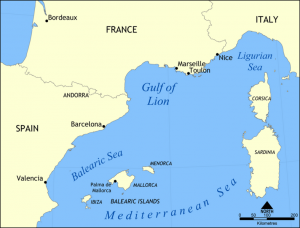Difference between revisions of "Gulf of Lyon"
m |
m |
||
| Line 1: | Line 1: | ||
| − | + | __NOEDITSECTION__ | |
[[Image:Gulf of Lion map.png|thumb|right|Map of the Gulf of Lion]] | [[Image:Gulf of Lion map.png|thumb|right|Map of the Gulf of Lion]] | ||
Revision as of 08:52, 1 October 2007
The Gulf of Lion (French: Golfe du Lion) is a wide embayment of the Mediterranean coastline of Languedoc-Roussillon and Provence in France, reaching from the border with Catalonia in the west to Toulon.
The chief port on the gulf is Marseille. Toulon is another important port. The fishing industry in the gulf is based on hake (Merluccius merluccius), being bottom-trawled, long-lined and gill-netted and currently declining from over-fishing.
Rivers that empty into the gulf include the Tech, Têt, Aude, Orb, Hérault, Vidourle, and the Rhône.
The continental shelf is exposed here as a wide coastal plain, and the offshore terrain slopes rapidly to the Mediterranean's abyssal plain. Much of the coastline is composed of lagoons and salt marsh.
This is the area of the famous cold, blustery catabatic wind called the Mistral.
Geodynamics
The Gulf of Lion is not a simple passive continental margin; it results from Oligocene-Miocene anti-clockwise rotation of the Corsican-Sardinian Block against the European Craton. This extension rejuvenated a very complex tectonic framework inherited from the Tethyan evolution and the Pyrenean orogeny. The Eocene mountain-building event that built the Pyrenees compressed and thickened the entire crust. Oil geologists predict that there will be considerable oil deposits at the seaward margins of the gulf.
